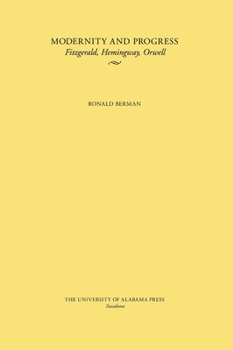Modernity and Progress: Fitzgerald, Hemingway, Orwell
Select Format
Select Condition 
Book Overview
Breaks new critical ground by exploring philosophical and aesthetic issues germane to the writings of three major modern literary figures.
In the 1920s and '30s, understandings of time, place, and civilization were subjected to a barrage of new conceptions. Ronald Berman probes the work of three writers who wrestled with one or more of these issues in ways of lasting significance.
Format:Hardcover
Language:English
ISBN:0817314687
ISBN13:9780817314682
Release Date:October 2005
Publisher:University Alabama Press
Length:136 Pages
Weight:0.81 lbs.
Dimensions:1.1" x 6.0" x 9.0"
Customer Reviews
0 rating





